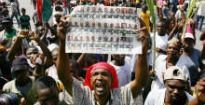Southern Sudan Votes on Independence
When the people of southern Sudan begin voting on independence on Sunday, there won’t be any Quebec-style ambiguity over “sovereignty-association” or shared passports.
The choice on the ballot papers is stark and simple. One option, marked “Unity,” is an image of two clasping hands. The other, marked “Secession,” is picture of an open hand, palm facing outward – as if waving goodbye.
fter decades of civil war, the vast majority of southern Sudanese voters are illiterate, so the visual symbols are important. They won’t need to worry about grasping a pen to tick a box. Instead, they need only to dip a finger in ink and place a fingerprint on the ballot – either in a big circle beside the image or on the image itself. No risk here of the “hanging chads” from punch-card ballots that bedevilled the 2000 U.S. presidential election.
The outcome is in little doubt, with a landslide vote for independence widely expected. The government of southern Sudan has thrown its full weight behind the secession option. The southern capital, Juba, is covered with government billboards and placards, promoting the “open hand” symbol of secession as the sole option.
There is only one plausible scenario that could just possibly thwart a vote for separation: The results will be invalidated if less than 60 per cent of the registered voters take part in the referendum. Many eligible voters are nomadic cattle-herders who live a day’s walk from the nearest voting station. There is no guarantee that they will vote.
But the government has thought of this, too. The referendum will continue every day for seven full days – and can be extended if necessary. To avoid the delays that plagued the Sudanese election last April, millions of extra ballots are being printed, and they are supposed to be sent to the voting stations at least 72 hours before the start of voting.
Even if powerful forces in Khartoum try to sabotage the referendum by manipulating the votes, they are unlikely to succeed. Only about 120,000 of the nearly 4 million registered voters are located in the north. (About 60,000 voters are living in the Sudanese diaspora in eight other countries, including Canada.) “We are confident that the people of the south will take the right decision and vote for secession,” said Michael Makuei Lueth, a senior cabinet minister in the southern government and a key negotiator on issues with Khartoum.
“There is no way other than secession,” he said. “And there is no way that the north can sabotage it, unless they decide to declare war and invade southern Sudan.”
Mr. Lueth is even confident enough to speculate on the name of the future nation that could be born in July after the mandatory six-month negotiating period. He says it could be called South Sudan, New Sudan or even the Republic of Kush – a reference to the Biblical kingdom of black-skinned people in what is now southern Sudan and Egypt. (A national anthem, titled “The Land of Cush,” has already been written.) He confirmed that his government has studied Quebec’s referendums on sovereignty association, along with other referendums on secession around the world. But unlike the Quebec votes, the referendum is taking place as two powerful armies confront each other across a disputed border, while hardliners are warning of possible war.
A few weeks ago, those warnings were taken very seriously. The fears began to subside this week when Sudan President Omar al-Bashir promised to respect the results of the referendum, no matter which side won.
Click here to read more.


